Bringing a new German Shepherd into your life, whether a spirited puppy or a wise older dog, is a truly rewarding experience. Many prospective owners dream of finding German Shepherd Puppies Free To A Good Home, hoping to offer a loving environment without the initial financial strain of purchasing from a breeder. While the term “free” often requires clarification within the world of reputable rescue and adoption, the core desire to provide a stable, caring home for a dog in need is commendable. This guide explores the realities of adopting German Shepherds, highlighting the urgent need for responsible homes for dogs of all ages, and providing insights into what it truly means to welcome one of these magnificent animals into your family.
German Shepherds are renowned for their intelligence, loyalty, and protective instincts, making them beloved companions worldwide. However, their popularity, combined with their specific needs for training, exercise, and mental stimulation, sometimes leads to them being surrendered to shelters. Our dog pounds are still far too full, with German Shepherds, alongside other breeds like Staffies, frequently among the most at-risk. Their only “crime” is often being surplus to requirements, unwanted, and unloved. Organizations dedicated to German Shepherd rescue urgently need foster homes and kennel spaces to provide these dogs with a temporary haven while they await their forever families. Even if you’re specifically searching for cheap australian shepherd puppies for sale, it’s worth exploring the world of rescue as many wonderful shepherd mixes also need homes.
Understanding “Free to a Good Home” in German Shepherd Adoption
The phrase “free to a good home” often evokes images of simply picking up a dog without any cost. While the emotional reward of adopting a dog is indeed immeasurable and “free,” most reputable rescue organizations, especially for breeds like the German Shepherd, will have an adoption fee. These fees are crucial for covering the costs associated with rescuing, rehabilitating, and rehoming dogs. This includes veterinary care (vaccinations, spaying/neutering, microchipping, and any necessary medical treatments), food, shelter, and behavior training.
Therefore, when you encounter the term “German Shepherd puppies free to a good home,” it typically means that the dog is available for adoption through a rescue or shelter, and the focus is on finding a responsible, loving environment rather than making a profit. The adoption fee, though an upfront cost, ensures that the dog has received essential care and that the prospective owner is serious about the commitment. It’s a small investment in a lifetime of companionship, ensuring your new companion starts their new life in the best possible health.
The Urgent Need for German Shepherd Homes
The reality in many shelters is grim. German Shepherds, with their imposing size and strong personalities, can be misunderstood or mismanaged, leading to behavioral issues that make them harder to rehome. This is particularly true for older German Shepherd dogs looking for a home, who often get overlooked in favor of puppies. However, older dogs frequently come with the advantage of being housetrained, having basic obedience skills, and a more predictable temperament. They have the same right to a nice home as younger dogs and often adapt beautifully to a new environment, showering their new families with unwavering devotion. Understanding the diverse list of all shepherd dog breeds, including German Shepherds, can help potential adopters appreciate the unique qualities and needs of these intelligent animals.
The commitment required to care for a German Shepherd, regardless of age, is substantial. They need consistent training, regular exercise, and ample mental stimulation to thrive. Without these, they can develop behavioral problems, which sadly contribute to the cycle of abandonment. This is why rescue organizations are so meticulous in their adoption processes, aiming to match each dog with the perfect family that can meet their specific needs.
The Lifelong Bond: Why Adopt a German Shepherd?
Adopting a German Shepherd offers a unique opportunity to save a life and gain an incredibly loyal and intelligent companion. George Graham Vest famously said, “The one absolutely unselfish friend that man can have in this selfish world, the one that never deserts him, the one that never proves ungrateful or treacherous, is his dog.” This sentiment rings especially true for German Shepherds, who form deep bonds with their families.
From a young age, German Shepherd puppies free to a good home, if raised responsibly, will grow into steadfast protectors and loving family members. They are eager to please and highly trainable, making them excellent candidates for various activities, from obedience and agility to therapy work. Even adult German Shepherds, with their established personalities, offer a profound companionship, often proving to be incredibly resilient and grateful for a second chance at happiness. The rewarding experience of watching a rescue GSD blossom in a loving environment is unparalleled.
Meeting German Shepherds Ready for Adoption: Past Success Stories and What to Look For
While the dogs featured in the original article have thankfully all been rehomed, their stories serve as powerful examples of the types of German Shepherds who come into rescue and the specific needs they often have. These profiles illustrate the dedication required from potential owners and highlight the incredible transformations possible with patience, understanding, and love. When searching for German Shepherd puppies free to a good home or an adult GSD, these examples offer valuable insights into common backgrounds and what makes a “good home.”
Kieira – A Loving Companion Needing Stimulation
Seven-year-old Kiera was a delightful, spayed girl good with children, though her lack of socialization meant she needed careful introductions to other dogs and was not suited for a home with cats. She was housetrained and traveled well but desperately needed a home where she would receive regular exercise and mental stimulation to prevent leash pulling and ensure her happiness. Her story emphasizes the importance of ongoing activity for even older GSDs.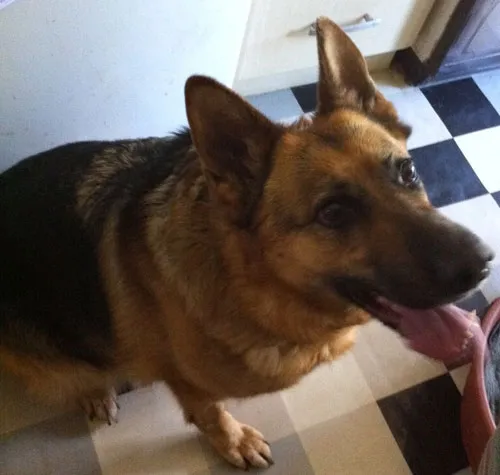 Loving German Shepherd Kiera needs active home
Loving German Shepherd Kiera needs active home
Zoey – Energetic Girl Deserving Attention
Four-year-old Zoey was a lively girl who barked at strangers but was ultimately very friendly and eager to please. Despite her previous owner’s inability to exercise her, she showed excellent obedience when taken out, staying close and returning immediately. She loved playing with her ball, had no food aggression, and traveled well. While she had lived with a male dog and a cat, her excitable nature meant a home without young children was best. Zoey’s case highlights that even loved dogs can suffer from a lack of appropriate stimulation.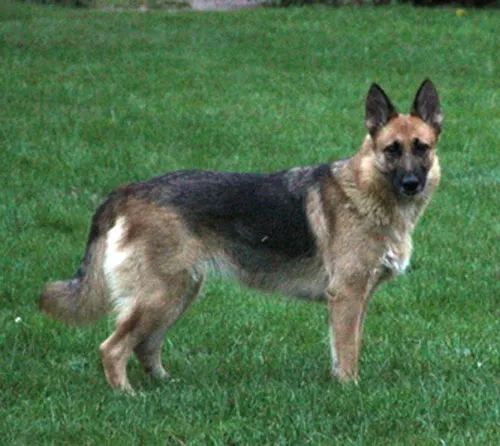 Energetic Zoey, a four-year-old German Shepherd seeking exercise
Energetic Zoey, a four-year-old German Shepherd seeking exercise
Benson – A Youngster Needing Boundaries
Benson, a one-year-old neutered male, was rehomed once before returning due to family changes. He had become overly protective of his owner and showed issues with other dogs on walks. He needed a firm, experienced owner who could teach him boundaries and acceptable behavior. Benson’s story is a reminder that young German Shepherd puppies free to a good home will eventually grow into strong adults who require consistent training and leadership.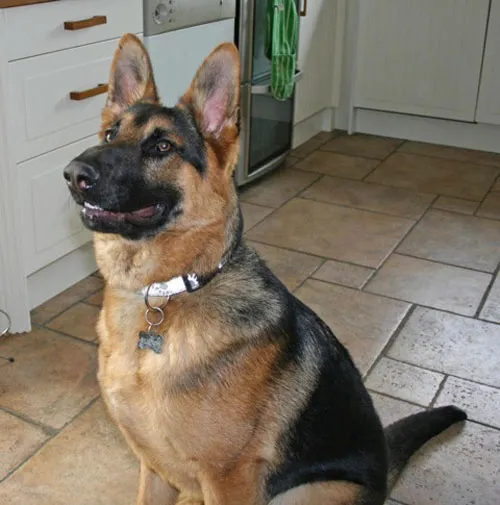 Young male GSD Benson needs firm guidance
Young male GSD Benson needs firm guidance
Shiloh – A Nervous Soul Seeking Solitude
Three-year-old Shiloh was a nervous but affectionate dog who, despite living with other dogs, was unhappy in their company and fought with them. She desperately needed to be the only pet in a home without young children, with an owner devoted to helping her settle and build confidence. Her experience illustrates that some GSDs thrive best as the sole focus of their human’s affection.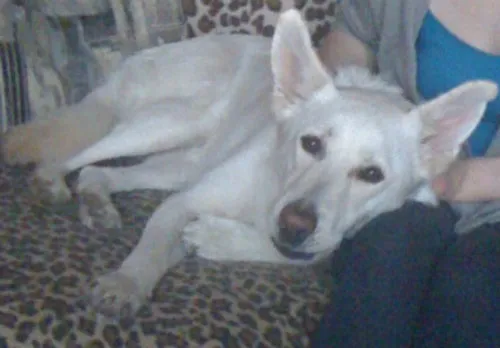 Nervous white German Shepherd Shiloh looking for a quiet home
Nervous white German Shepherd Shiloh looking for a quiet home
Blue – Overcoming Fear Aggression
Blue, a three-year-old entire white German Shepherd, came into foster care due to his previous owners’ inability to control him. He suffered from fear aggression, trying to nip strangers, but with patience and time, he began to trust humans again. He needed an experienced GSD home, preferably as the only pet and without children, to continue his progress. Blue’s story is a testament to the power of rehabilitation and patience.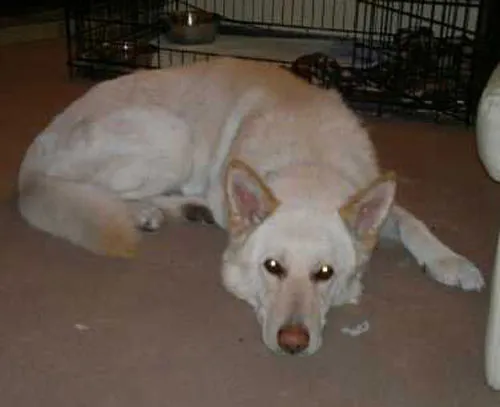 Handsome white German Shepherd Blue in foster care
Handsome white German Shepherd Blue in foster care
Saber – An Active Senior in Need
At ten years old, Saber was a very fit and lively entire male who loved to play and cuddle. Due to family constraints, he was living in a confined space and left alone for long periods. He urgently needed a kind and loving home where he could get the time and attention he deserved. Saber’s excellent recall and good nature with other dogs and cats show that age is just a number.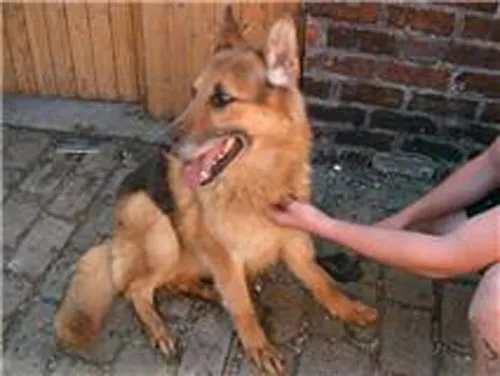 Active older German Shepherd Saber needs loving attention
Active older German Shepherd Saber needs loving attention
Frank – A Gentle Giant Seeking Experience
Frank, a four-year-old GSD x Ridgeback, was a large, neutered dog who had been found as a stray. He excelled in training and even went to work with his previous owner. Though initially needing careful introductions to new people, he proved adored by kennel staff. Frank’s story emphasizes that big dogs often have big hearts, but need experienced owners comfortable with their size and strength. Frank, a large GSD Ridgeback mix, seeks experienced owner
Frank, a large GSD Ridgeback mix, seeks experienced owner
Rocky – A Youngster Overwhelmed by Lack of Care
Rocky, a stunning 22-month-old German Shepherd, desperately needed a forever home. Despite living with young children, his excitable behavior and size meant he was best rehomed with older children. He hadn’t been socialized with other dogs but could be with effort. Rocky’s case highlights the unfortunate reality of irresponsible breeding, where dogs become too much for families unable to provide the necessary stimulation and exercise.
Tala – A Leader in Training
Two-year-old Tala was a lovely entire male who lived with children but needed to be placed with older, more experienced ones. He loved playing with other dogs but was a definite no to cats. Tala required firm handling to know who was the leader and would benefit from further training, especially off-lead. His story reminds us that some German Shepherd dogs need clear leadership to thrive.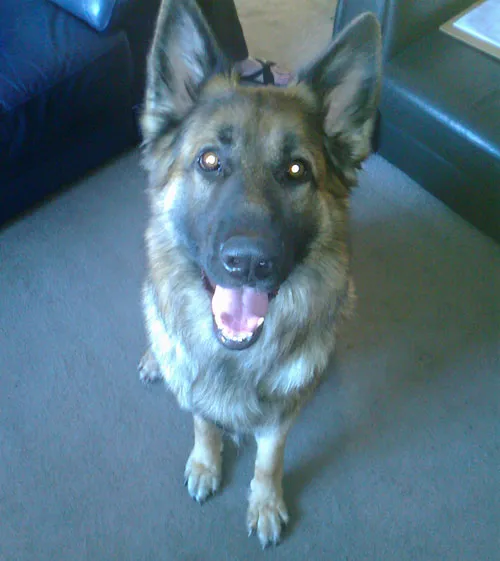 Two-year-old German Shepherd Tala needs consistent training
Two-year-old German Shepherd Tala needs consistent training
Camy Lou – A Sensitive Girl with a Past
Camy Lou, a beautiful five-year-old spayed bitch, had a rough start. Her current owners rescued her from a sorry state a year prior. She was calm and friendly but suffered from toy aggression, leading to an incident with another dog in the home. She needed an experienced GSD owner with no other pets or children. Camy Lou’s journey exemplifies that some rescue dogs have specific triggers that require careful management.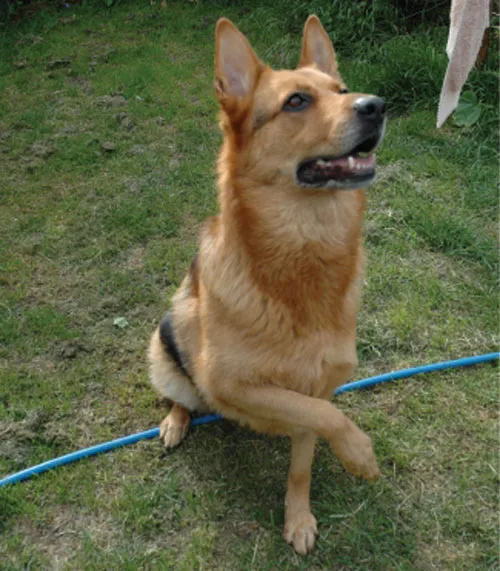 Beautiful spayed German Shepherd Camy Lou needs single pet home
Beautiful spayed German Shepherd Camy Lou needs single pet home
Layla – A Road to Recovery
Layla, a lovely two-year-old bitch, was found underweight and with little muscle tone, kept in a rundown outdoor kennel. She was very friendly and simply yearned for attention. Her owner’s illness left her struggling, highlighting the fragility of a dog’s well-being when circumstances change. Layla needed time, patience, and love to regain her health and would ideally suit an experienced owner without young children.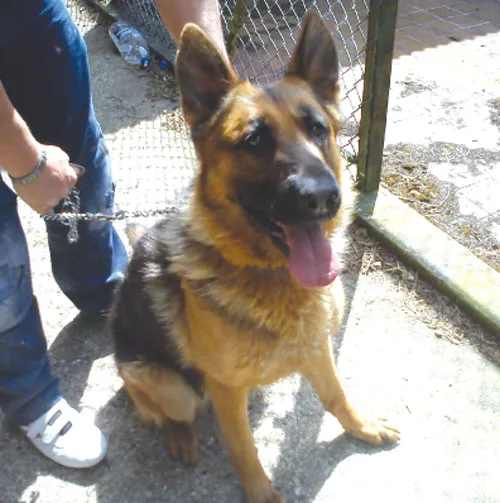 Underweight German Shepherd Layla rescued from neglect
Underweight German Shepherd Layla rescued from neglect
Willow – A Big Boy Needing Guidance
Willow, an utterly gorgeous, large four-year-old entire male, needed a family with much older teenagers or no children, definitely no cats, and careful introductions to other dogs. His size and strength meant he needed ground rules and owners willing to work with him. Willow’s story is a reminder that large shepherd dog breeds, including black and white varieties, require specific handling and training.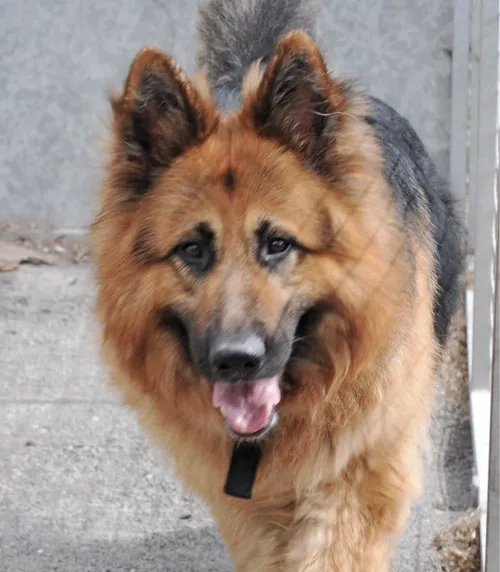 Gorgeous large long-coated German Shepherd Willow
Gorgeous large long-coated German Shepherd Willow
Buddy – Seeking an Active Family
Eight-year-old Buddy was a lovely, energetic dog who lived with a family and a cat and played with other dogs. However, food aggression and behavior towards family members led to his need for a new home. His energy was likely due to lack of exercise and stimulation, suggesting he would thrive with an active family, preferably with older children.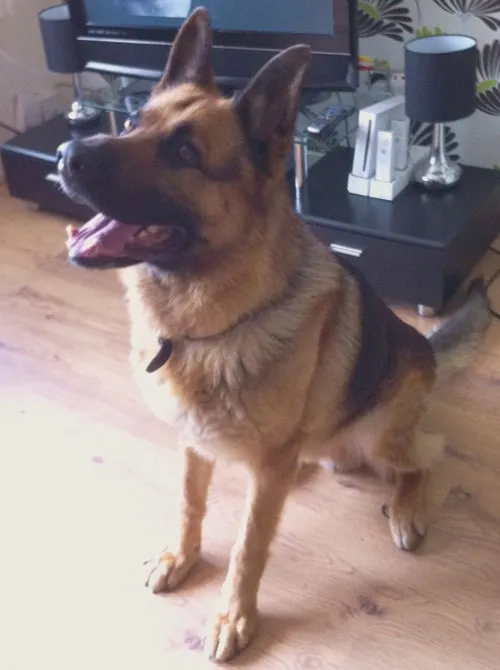 Buddy, an eight-year-old German Shepherd with food aggression issues
Buddy, an eight-year-old German Shepherd with food aggression issues
Petra – A Survivor Needing Confidence
Petra, a five-year-old unspayed GSD, had a horrible start, chained 24/7 on a traveler’s site and likely abused. She was very nervous of lighters and matches. Despite her past, she was friendly with friendly people, but disliked small dogs and cats. Petra, who also had a joint problem, needed confident and understanding owners. Her story is a poignant example of the resilience of rescue dogs.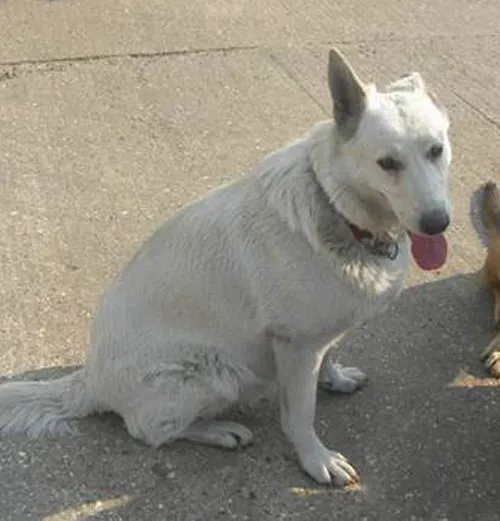 Petra, a nervous white German Shepherd with a joint problem
Petra, a nervous white German Shepherd with a joint problem
Louie – A Water Baby Needing Structure
Eight-year-old Louie was a friendly, neutered, vaccinated, and housetrained lad who was overweight due to lack of exercise. He walked well on a lead after initially pulling and loved to swim. Louie would dominate other dogs, making him best suited as an only dog, and he hated fireworks. His need for attention and exercise shows that even older GSDs thrive with routine and care.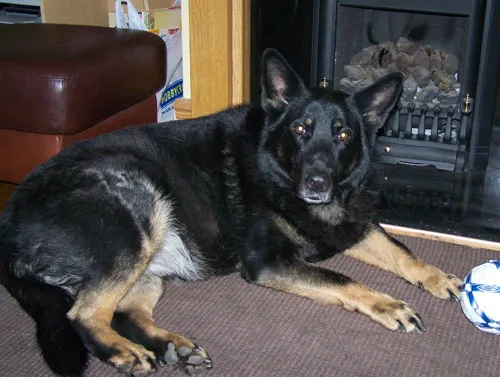 Friendly older German Shepherd Louie enjoys swimming
Friendly older German Shepherd Louie enjoys swimming
Bruno – A Yard Dog Seeking a Home
Bruno, a four-year-old longhaired entire male, lived chained in a barn because he kept escaping and harming neighbors’ chickens. While chained, he showed aggression, but when free, he was very friendly. He was good with children, other dogs, and cats. Bruno desperately needed a chance to be a pet rather than a yard dog.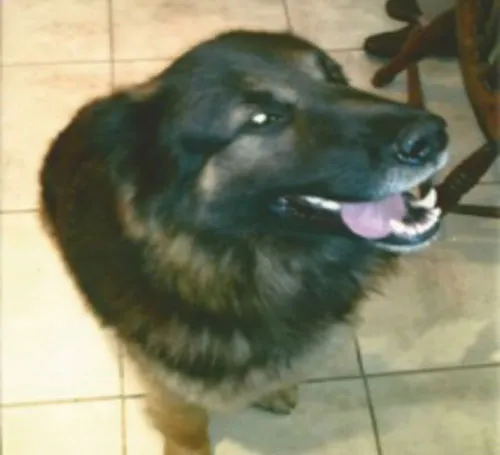 Long-haired German Shepherd Bruno needs freedom and training
Long-haired German Shepherd Bruno needs freedom and training
Bailey – The Underslept Socialite
Five-year-old neutered Bailey showed aggression issues due to being left alone for long periods and under-stimulated. Our volunteer found him very social with no signs of aggression, highlighting that many behavioral problems stem from neglect. Bailey needed an experienced GSD owner who could channel his attention positively.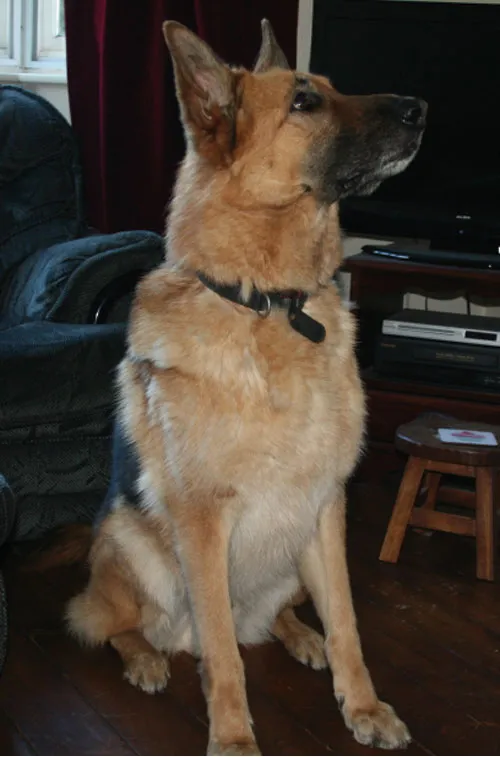 Bailey, a five-year-old German Shepherd needing positive direction
Bailey, a five-year-old German Shepherd needing positive direction
Jake – A Neglected Gem
Jake, a three-year-old neutered male, was being left alone for long periods, not walked or groomed. Despite the neglect, he was a friendly boy desperate for a home where he would be loved, groomed, and receive the attention and exercise every dog deserves.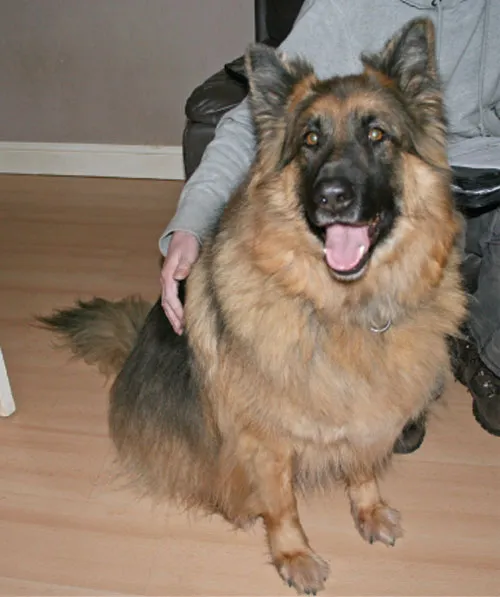 Long-coated German Shepherd Jake seeking love and exercise
Long-coated German Shepherd Jake seeking love and exercise
Theo – A Social Butterfly at Home, Not Out
Four-year-old Theo was a beautiful neutered boy who lived well with another dog and children but disliked other dogs when out. He needed an experienced GSD owner to guide and stimulate him. Theo’s story shows that some GSDs thrive in controlled social environments but need management in public.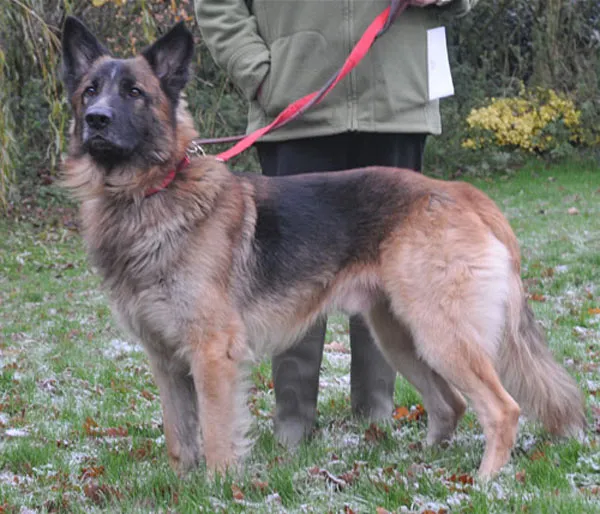 Theo, a beautiful semi-coated GSD requiring experienced owner
Theo, a beautiful semi-coated GSD requiring experienced owner
Gandalf – A Special Boy with a Big Heart
Two-year-old Gandalf, or G Bear, was good with children but needed to be the only pet due to a past attack and his desire for all the fuss. He had hip dysplasia, but good muscle tone meant no operation was needed. Gandalf needed an experienced owner who understood his behavior.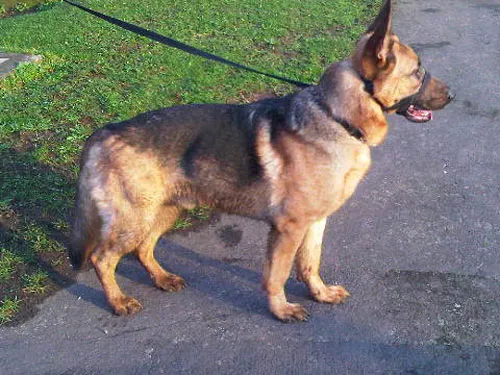 Gandalf, a two-year-old German Shepherd with hip dysplasia
Gandalf, a two-year-old German Shepherd with hip dysplasia
Lulu – A Lovely Girl with Allergies
Three-year-old Lulu, fully vaccinated, micro-chipped, and spayed, was in foster care. She was okay with most dogs but not small ones, and definitely no cats. She suffered from dust and food allergies, requiring medication and a special diet. Lulu needed a firm handler who could provide guidance, socialization, and allergy care.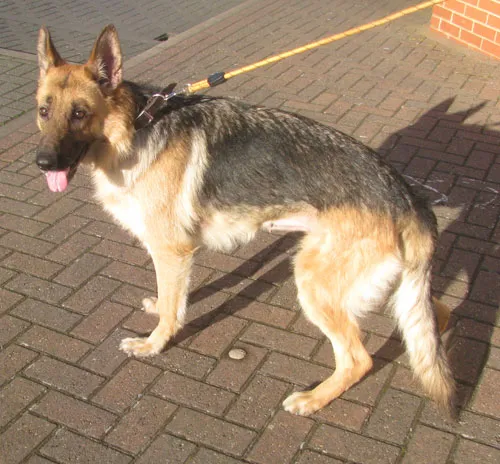 Lulu, a beautiful German Shepherd with allergies, needs gentle care
Lulu, a beautiful German Shepherd with allergies, needs gentle care
Debo – The Socialization Project
Debo lacked socialization with people and dogs, showing aggression initially but calming down with guidance. He was a big, strong boy who pulled on the lead but was good off-lead without distractions. Debo needed a firm handler with breed experience, lots of socialization, and plenty of exercise and grooming.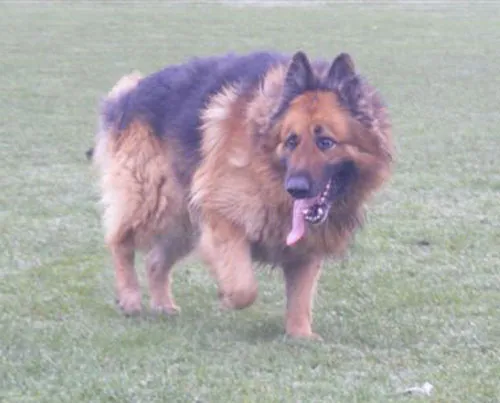 Debo, a large German Shepherd needing extensive socialization
Debo, a large German Shepherd needing extensive socialization
These diverse stories paint a clear picture: German Shepherd puppies free to a good home, or adults, require dedication, understanding, and often, an experienced owner.
The Journey of Adopting a German Shepherd Puppy or Adult
Adopting a German Shepherd, whether a puppy or an adult, typically involves several steps designed to ensure a successful match:
- Application: Fill out a detailed application form, providing information about your living situation, pet ownership history, and experience with GSDs.
- Screening: Rescue organizations will often conduct a phone interview, followed by a home visit to ensure your environment is suitable for a German Shepherd.
- Meet-and-Greet: You’ll be given the opportunity to meet prospective dogs, potentially multiple times, to gauge compatibility.
- Trial Period (sometimes): Some rescues offer a foster-to-adopt program, allowing the dog to live with you for a trial period.
- Adoption Contract & Fee: Once a match is confirmed, you’ll sign an adoption contract and pay the adoption fee.
This thorough process benefits both the dog and the adopter, setting the stage for a lasting relationship.
Are German Shepherd Puppies “Free”? Costs Associated with Pet Ownership
While the initial adoption fee might seem like a barrier for those seeking German Shepherd puppies free to a good home, it’s a minimal part of the overall cost of responsible pet ownership. Owning a German Shepherd involves significant ongoing expenses:
- Food: High-quality food is essential for their health and well-being.
- Veterinary Care: Routine check-ups, vaccinations, parasite prevention, and unexpected medical emergencies can be costly.
- Training: Professional training classes are highly recommended, especially for GSD puppies, to ensure they develop good manners and obedience.
- Supplies: Collars, leashes, crates, beds, toys, and grooming tools.
- Insurance: Pet insurance can help mitigate the cost of unforeseen medical issues.
A German Shepherd is a significant financial and time commitment for 10-14 years. It’s crucial to be prepared for these expenses to provide your dog with a happy and healthy life.
Finding Your German Shepherd: Rescue Organizations and Resources
For those serious about finding German Shepherd puppies free to a good home, or adopting an adult GSD, connecting with reputable rescue organizations is the best path. These groups are dedicated to the welfare of the breed and provide extensive support throughout the adoption process.
- Breed-Specific Rescues: Search for “German Shepherd rescue” in your region or country.
- Local Shelters: Many local animal shelters also have GSDs and GSD mixes awaiting adoption.
- Online Adoption Platforms: Websites like Petfinder or Adoptapet list adoptable dogs from various rescues and shelters.
Always do your due diligence when researching a rescue. Look for organizations that are transparent about their processes, provide thorough vet care, and offer post-adoption support. These organizations prioritize the “good home” aspect above all else, ensuring the best outcome for their dogs.
Conclusion
Adopting a German Shepherd, whether a puppy or an adult, is a profound commitment that promises unparalleled loyalty and companionship. While the search for German Shepherd puppies free to a good home often initiates the journey, it’s the dedication to providing a truly “good home” – one filled with love, proper care, training, and attention – that ultimately matters most. Every dog deserves a second chance, and by choosing to adopt, you not only save a life but also gain a friend, partner, and defender for life. As the saying goes, “He is your friend, your partner, your defender, your dog. You are his life, his love, his leader. He will be yours, faithful and true, to the last beat of his heart. You owe it to him to be worthy of such devotion.” Consider opening your heart and home to a German Shepherd in need today.
For more information on dog breeds and responsible pet ownership, explore other valuable resources on DogCareStory.com.
References:
While the original article did not provide explicit references, the information presented regarding German Shepherd care, behavior, and adoption practices aligns with general veterinary and animal welfare guidelines. Reputable sources for further information include:
- The American Kennel Club (AKC)
- The German Shepherd Dog Club of America
- Local animal welfare organizations and rescue groups (e.g., German Shepherd Rescue organizations)
- Veterinary professionals and certified dog trainers
